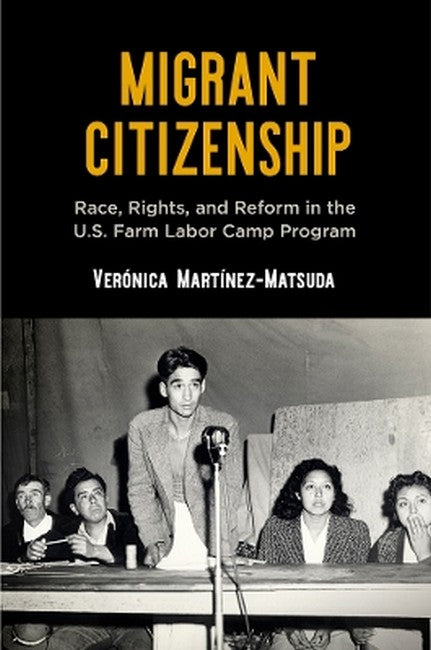Veronica Martinez-Matsuda is Associate Professor of History at the University of California San Diego.
Request Academic Copy
Please copy the ISBN for submitting review copy form
Description
"Martinez-Matsuda provides a detailed glimpse into a moment of historical possibility that has many lessons for present-day advocates of civil rights for immigrant communities. Migrant Citizenship is powerfully written, exceptionally researched, and an outstanding contribution to the literature on immigration, labor, and citizenship studies." (Journal of American Ethnic History) "Migrant Citizenship tells a powerful story about how agricultural workers, Popular Front activists, and New Deal liberals reimagined the power of the state. Spanning multiple regions and communities, Martinez-Matsuda beautifully animates individuals, families, and communities." (Labor) "Veronica Martinez-Matsuda's research takes us far beyond John Steinbeck's Weedpatch Camp, the Joad family's gleaming refuge in The Grapes of Wrath (1939), to the multiracial, nationwide network of migrant labor camps as sites of contest over full national belonging and citizenship. . . . With archival research and oral histories from camps across the nation, including Texas and Florida as well as California, Martinez-Matsuda reveals the physical layout of FSA camps (110 total in 1942) as spaces that not only contained and disciplined residents but also formed the literal grounds for new connections, communities, and improved health and welfare." (Journal of American History) "In Migrant Citizenship, Martinez-Matsuda tells the hopeful story of a short-lived experiment by New Deal progressives to extend the era's promise of robust citizenship and a dignified standard of living to farmworkers, including Mexican Americans and African Americans. While historians to date have dismissed the Farm Security Administration (FSA) camp program for its failures, Martinez-Matsuda foregrounds migrants' own perspectives to hold it up as a useful example of historical possibility. The result challenges both the characterizations of the New Deal as having effectively ignored the rural poor and the overdetermined declensionist narratives of farmworkers' rights in the face of twentieth-century agricultural capitalism." (Southwestern Historical Quarterly) "Migrant Citizenship is a magisterial study of the Farm Security Administration and the people it served. In an evocative work that speaks across several fields, Veronica Martinez-Matsuda reveals how FSA officials on the ground and in Washington challenged the political mind-set during World War II by expanding the range of services offered and the hopes for reform encoded within them, highlighting the agency's visionary experiments in democracy." (Vicki L. Ruiz, University of California, Irvine) "Veronica Martinez-Matsuda foregrounds the perseverance of the workers-especially Japanese and Mexican-who occupied agricultural labor camps in the 1930s and 1940s and drew upon the promises made during the New Deal to argue for 'civil rights' well before the concept applied to Latinx or Asian Americans. Her most important intervention may be her argument that the Farm Security Administration tried (and failed) to extend rights to noncitizens, anticipating the current vogue of rights regardless of citizenship. Migrant Citizenship will appeal to anyone interested in understanding the origins of farm worker activism in this country and the continued struggle to hold the state accountable for injustice in our food system." (Matt Garcia, author of From the Jaws of Victory: The Triumph and Tragedy of Cesar Chavez and the Farm Worker Movement)

